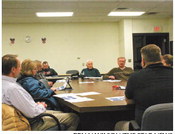County levy up, but tax rate continues to fall
Taylor County will tap into reserve funds to keep a levy increase manageable for taxpayers.
At Monday’s county finance committee meeting, members gave their stamp of approval to the proposed 2025 budget after making changes to use additional funds from county forest revenue rather than short-term borrowing for the planned construction of an addition to the Commission on Aging office. The budget calls for $33,769,422 in total spending. This is an increase of 3.55% over the 2024 budget.
Under that budget, local taxpayers will be responsible for $14,645,685 as their portion of the tax levy. This is up about $499,000 from last year’s levy, an increase of about $3.5% The levy will result in a projected tax rate of $6.58 per $1,000 of equalized value. The county is also using $1.65 million in anticipated county sales tax revenue to reduce the 2025 proposed budget.
The proposed tax rate is a decrease from the current budget year which had a rate of $6.71 per $1,000 of equalized
Spectrum
value. This is a reduction of 13 cents per $1,000 or a savings of $13 on a home with an equalized value of $100,000.
The equalized value for all property in Taylor County jumped 5.5% over last year by $116,242,400 to $2,225,181,900.
Members of the county’s budget review committee include chair Chuck Zenner and members Scott Mildbrand, Catherine Lemke, Mike Bub and Lisa Carbaugh. Finance director Tracy Hartwig served to coordinate the budget process.
The budget approved by the committee will go to the full county board for action on October 30 with a public hearing on the budget at 10:30 a.m. on that day.
The proposed budget was the end product of a series of meetings held between committee members and county department heads. As in past years, departments were instructed to keep operational increases to 0%. Many of the departments were able to do so with some such as forestry coming in with operational budgets lower than what they had been in prior years.
For most county departments, employee wages and benefits resulted in the highest increases.
During the budget process the county
Spectrum
approved a new pay scale reorganizing where existing positions are on the county’s pay matrix based on job duties and longevity. This was done in light of the county falling behind in being competitive in attracting workers for some positions.
There was some good news in the budget writing process with the county being informed that there would be no increase this year to the county’s health insurance premiums. The preliminary budget had been based on a 5% increase. This freed up funds for other areas and reduced the number of cuts that needed to be made to reduce the budget levy.
The budget committee is also utilizing some short-term borrowing primarily to provide matching funds for upcoming highway projects.
Coming into the final budget review session on Monday morning was how much the county should spend down reserves versus using additional borrowing to pay for projects including the new offices for aging and disability resource center staff members.
Hartwig recommended retaining the reserves, which are used for county cash
See COUNTY on page 4 County finance committee OKs proposed budget with levy increase
flow purposes throughout the year, and using short term borrowing of $550,000. Short term borrowing allows the county to exceed the state imposed levy cap by putting the entire debt service payment into the budget and paying it off following tax settlement in early spring.
This would have resulted in a net levy increase of 4.94% over last year and would have still resulted in a slight dip in the tax rate.
However, committee members felt more needed to be done in order to reduce what is being paid by taxpayers.
Bub noted that at previous meetings there was talk of taking the $200,000 building expense out of the land acquisition account in the forestry department. As logging projects are completed, a percentage of the stumpage revenue goes into the land acquisition account to have money on hand for the purchase of additional county forest land. County code caps the amount of that fund at $500,000.
In practice, the land acquisition fund, along with all other designated reserve funds, are part of the county’s fund balance which is essentially a shared pool of funds to help with county operations.
Bub called for the money to specifically come from land acquisition in order to send the message that the county will not have the money to go purchase additional property. “I know it is just taking it out the the pot,” Bub said.
Milldbrand agreed and said he would also like to emphasize that the $75,000 owed to Taylor County from the ADRC of the Northwoods would also go to repaying the amount for the additional office space.
In the past the county had advanced the ADRC of the Northwoods $75,000 in order to help it with cash flow. The ADRC is funded through reimbursements from state and federal programs which can take several months to arrive.
Larry Brandl, the county’s former finance director and who has been volunteering helping Hartwig with the budget process, said that the $75,000 is already listed as a receivable in the county budget.
“I want to reinforce that we expect that money back,” Mildbrand said, sharing suspicion that the ADRC of the Northwoods is hoping the county forgets it owes that money.
In the end, committee members approved taking the additional fund balance out of the land acquisition account. The reminder to the ADRC of the Northwoods was approved as a separate resolution to go to the full county board.
The action raised the amount of fund balance to be applied to the budget to $550,000 and reduce borrowing to $350,000.
“I can live with that,” Bub said.
However, prior to approving the final budget, Bub noted there were some budgets that had seen larger percentage increases. In particular he asked to revisit the emergency management budget noting that in recent years the office has gone from being part-time to expanding to 40 hours and taking on other projects.
“Why is it going up so quickly?” Bub asked, One of the biggest increases in the department was wages with the position going from 35 hours per week to 40 hours per week. However, the increase appeared in the budget more dramatically since last year the county’s health department had been able to use grant funds to pay for 10 hours of the emergency management director’s time for specific grant projects that had to be done.
That ended after there were concerns that those projects were not being done and could be questioned when audited.
Bub noted there are a lot of things that are not being done in the county that could be, but that they may not be the place to invest taxpayer dollars.
Bub said he was aware that in the total county budget the emergency government was “peanuts,” but wanted further discussion on it.
Director Dan Gellert was called to the meeting and explained the need for additional time describing past emergency government directors as “checking boxes” when it came to required programs for grants. He said he has been working to bring the county up to where it should be.
He also said that while emergencies don’t happen every day, the planning and follow up from them continues. For example, he has worked with municipalities in getting disaster aids for winter storm damage and for this summer’s severe weather.
“I am not just checking boxes, I am doing a lot more than what my predecessors had been doing,” he said.
Lemke questioned the agreement with his office and the health department and why he wasn’t making sure the work was getting done in order to continue the 10 hours of grant funding for his position.
“I wasn’t able to get everything done,” he replied, giving the example of having well over 500 pages of plans that had not been updated for several years. He said in some cases it is going though it page by page and line by line. Gellert has also being involved in the county’s ambulance project and other work.
“In my office in one day I am touching 16 projects,” he said.
Committee members also asked about the grant funded vehicle purchase. This has been a sticking point for county officials after it was found that Gellert had used grant funds to purchase a vehicle after his oversight committee had turned down his request for a vehicle.
A major question had to do with ongoing costs including fuel, insurance and registration. Hartwig said that it was her understanding after previous finance meetings that all of those costs would have to come out of the grant.
Gellert noted that there was a savings for the county for him to use the vehicle for emergency management work rather than having the county reimburse him for mileage for his personal vehicle.
“If it is going to be that big of a problem I will sell the vehicle,” Gellert said noting he would go back to getting mileage reimbursements. He said it benefits the county to be able to use the vehicle.
Bub noted the budget deficit coming into the meeting and that it was important to look at savings wherever they could. One of Bub’s major issues expressed through the budget process has been with purchases made with grant dollars, especially referencing computer equipment, which then goes to the levy to replace and maintain.
In the end, no changes were made to the emergency management budget and the committee approved sending the proposed budget to the full county board.
In other business, finance committee members on Monday approved a new twoyear contract for medical examiner Mark Perrin.
According to county human resources director Nicole Hager, the new contract is identical to the existing one. Perrin, as medical examiner is treated as a county employee. However, Hager noted that when they look at his annual salary and the number of cases he deals with each year, it comes to paying less than minimum wage. The medical examiner is paid an annual wage of $12,800.
The medical examiner is involved in investigating deaths that occur at accidents or outside a medical setting as well prior to cremation to determine if there is suspicion of wrongdoing.
Taylor County Finance Director Tracy Hartwig asks a question during a recent budget review session.
BRIAN WILSON/THE STAR NEWS


